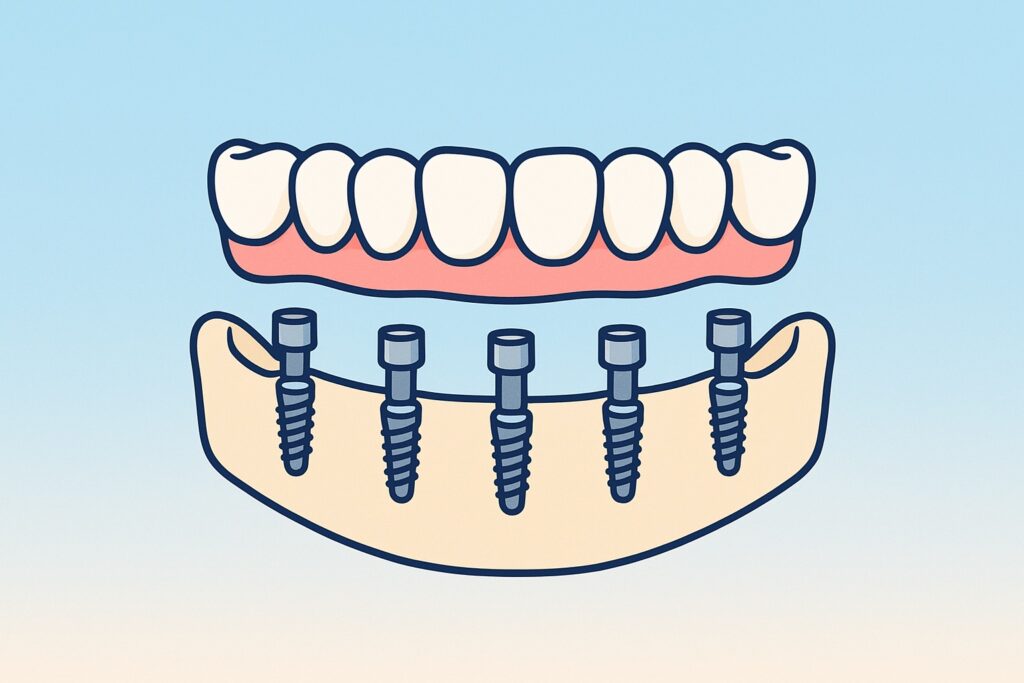Losing all your teeth can be overwhelming. Beyond the obvious changes in appearance, complete tooth loss can affect speech, chewing ability, and overall confidence. Many people in this situation assume that dental implants are not an option for them, but that’s not true. Even if you have no teeth left, modern implant dentistry offers reliable solutions to restore a full smile.
Understanding Complete Tooth Loss
When a person has no natural teeth remaining, the condition is called edentulism. This can affect either the upper jaw, lower jaw, or both. Tooth loss often happens gradually, but in some cases, teeth are removed all at once due to severe decay or gum disease.
Common causes of complete tooth loss include:
- Advanced periodontal (gum) disease
- Severe untreated cavities
- Injury or trauma
- Long-term wear from dentures without implants
Living without teeth impacts more than just appearance. It can make chewing difficult, limit food choices, affect nutrition, and even change facial structure over time due to bone loss. Many patients also experience speech difficulties and reduced confidence in social situations.
Can You Get Dental Implants With No Teeth?
Yes, it is possible to get dental implants even if you have no teeth. Dental implants are titanium posts placed into the jawbone, acting as artificial tooth roots. Once the implants fuse with the bone, they can support replacement teeth such as bridges, dentures, or fixed full-arch prosthetics.
For patients without any teeth, the main factor dentists evaluate is bone health. After tooth loss, the jawbone naturally begins to shrink over time. If too much bone has been lost, procedures like bone grafting or sinus lifts may be needed to create a stable foundation for implants.
Other requirements include healthy gums and good overall health. Patients with conditions such as uncontrolled diabetes, heavy smoking habits, or severe bone loss may face additional challenges, but solutions often exist with proper planning.
Full-Mouth Implant Options
When all teeth are missing, dentists use specialized implant techniques designed to replace an entire arch of teeth. The most common solutions include:
All-on-4 and All-on-6 Implants
These systems use four or six strategically placed implants to support a fixed set of replacement teeth. They provide a permanent solution that looks and feels natural, and they often eliminate the need for bone grafting because the implants are angled for maximum stability.
Implant-Supported Dentures
Instead of resting on the gums like traditional dentures, these snap onto implants for added security. They can be removable or fixed, depending on patient preference, and they significantly improve chewing ability compared to conventional dentures.
Fixed Bridges on Implants
For patients who want a completely non-removable solution, an implant-supported bridge can replace a full arch. This option typically requires more implants than the All-on-4 method but provides excellent stability and function.
Benefits of Implants for People With No Teeth
Dental implants offer several advantages compared to traditional dentures for patients with complete tooth loss:
Improved Function
Implants restore bite strength, allowing you to chew a wider variety of foods comfortably. Unlike loose dentures, they stay secure while eating and speaking.
Long-Term Durability
With proper care, implants can last decades. They provide a stable foundation for replacement teeth, reducing the need for frequent adjustments or replacements.
Natural Appearance and Comfort
Implant-supported teeth look and feel more like natural teeth. They prevent the sunken facial look that often occurs with long-term denture use, maintaining a more youthful appearance.
Better Oral Health
Implants help preserve jawbone density by stimulating the bone, which prevents the shrinkage that happens after teeth are lost.
Potential Challenges and Considerations
While dental implants are possible for people with no teeth, there are some important factors to consider before treatment:
Bone Loss
After teeth are lost, the jawbone naturally shrinks. If too much bone is missing, grafting procedures may be required to build a solid foundation for implants.
Healing and Recovery
Implant surgery requires time for the bone and implants to fuse together, a process called osseointegration. Healing may take several months before permanent teeth can be attached.
Cost
Full-mouth dental implant solutions can be more expensive than traditional dentures. However, their durability and long-term benefits often make them a cost-effective choice over time.
Medical Conditions
Patients with uncontrolled health issues, such as diabetes or heavy smoking habits, may face higher risks of complications. A thorough dental and medical evaluation is essential before treatment begins.
Conclusion
Even if you have lost all your teeth, dental implants can provide a stable, long-lasting solution to restore your smile. Options such as All-on-4 implants, implant-supported dentures, and fixed bridges allow patients to regain natural function, confidence, and comfort. While bone health, healing time, and costs are important considerations, modern dentistry offers effective solutions for most people with complete tooth loss. The best next step is to consult with an experienced implant dentist to determine the right treatment plan for your individual needs.

